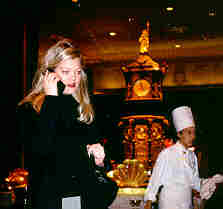By Les Spielman
My first adventure at HITEC was over thirty years ago. Since then, I haven’t missed one. Each year, one technology niche stands out above the rest, even in incremental years. This year, it appeared to be the year of the mobile app.
Technology continues to change the way the world communicates; and mobile devices, especially tablets and smartphones, have become so central to consumers’ personal and professional lives that hoteliers are taking notice, with checkbooks in hand, ready to buy solutions that drive their mobile strategies and deliver results.
devices, especially tablets and smartphones, have become so central to consumers’ personal and professional lives that hoteliers are taking notice, with checkbooks in hand, ready to buy solutions that drive their mobile strategies and deliver results.
At HITEC, we observed an increasing number of vendors showcasing solutions that drive hotel services and local information to the guest’s mobile device. There are apps that enable guests to make restaurant reservations, book spa treatments, request in-room dining, wake up calls, extra pillows or a toothbrush. Some include links to external services, such as airport check-in services, local weather forecasts and social networking sites. Others include a booking engine to make reservations for future stays, a platform for in-room shopping, and a way to promote partner services with local business to drive additional revenue for the hotel.
This year at HITEC in Minneapolis, I visited twelve companies that were showing tablet and smartphone application solutions. Next year there will probably be 8 and the following year, the number will surely winnow down to 3 – 4 vendors. Consolidation is predictable and beneficial in this industry. Yet this year: so many vendors and so little differentiation. After a while, it just seemed to get boring. Possible three vendors stood out as having complete, useful products. Most of the others looked like “me too” products.
What hoteliers need to be aware of is that not all apps are simple for guests to use, and many don’t have a practical interface on the back-end for staff to manipulate or change data such as prices. There is also the challenge of getting guests to actually ‘engage’ with the services provided. It’s great to offer an app; but it can be a costly investment if guests don’t know the service exists and end up not using it. If guests can download an app to their personal iPad or smartphone before or at arrival, guests can begin booking services long before they need them and find some services completely booked. If the information is presented in their native language, chances of engagement are even higher.
Don’t dismiss the need for real-time reporting when it comes to a mobile concierge solution. A mobile strategy will not be as robust without reports that provide a detailed snapshot of guest usage. Being able to track guest activity and purchasing trends is a real asset to hotel marketers to better target their audience, as well as to guest-facing staff who are providing them with personal service.
It’s equally as important to track guest service requests so that nothing slips through the cracks. Hoteliers should select a solution that enables staff to easily respond to requests and send text, audio or video messages, including welcome messages or promotions, to expand on delivering personalized service. After all, that’s what a mobile concierge is all about – giving guests what they want, when they want it, and on the technology platform they prefer.
As a guide to the hotelier, HACL has put together a quick easy checklist to use when considering a mobile guest-centric system.
Consider using this HACL Mobile Concierge mobile application checklist:
Is it user friendly?
Does it facilitate easy ordering with supporting images?
Does it provide information in real time?
Does it support a platform for both tablets and phones?
Does it enable two-way instant messaging?
Does it promote and reward in-room shopping?
Is it multi lingual?
Does it deliver the most up-to-date information?
Does it track orders and provide delay alerts?
Does it enhance the guest experience?
Does it enhance customer service by being available regardless of time or location?
Is it an extension of the hotel’s physical concierge services?
Does it support multiple guest access points, including in-room iPads, guest personal devices, lobby kiosks, etc.?
Is it customizable and flexible to reflect the hotel’s brand?
Does it improve marketing?
Is it quick to install and operate in the cloud and over the hotel’s WiFi network to remove the need for local servers?
Does management have complete content control and the ability to make changes to design, products, options, languages and prices in real time?
Does it integrate with the hotel’s existing PMS and HTNG certified PMS systems?
Will my finished app have a differentiated and branded look distancing it from my competitor’s apps?
Will the vendor customize my apps to my specifications?
